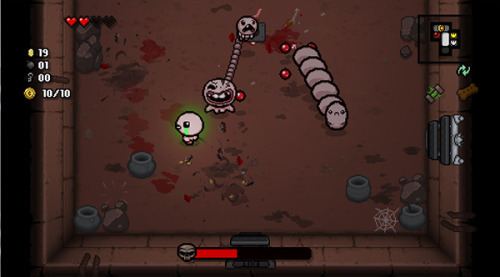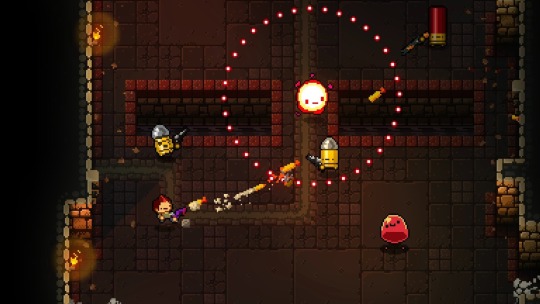Trending
Opinion: How will Project 2025 impact game developers?
The Heritage Foundation's manifesto for the possible next administration could do great harm to many, including large portions of the game development community.
The differences between "Enter the Gungeon" and "The Binding of Isaac" gives us a great chance to examine how the level of dependence between attack and defense chance the feel of a game.

Enter the Gungeon and The Binding of Isaac are both top down 2D action games with a focus on ranged combat. If we limit ourselves to only thinking about the combat then the biggest difference between these two games is the freedom with which you can aim. In EtG you can shoot freely in 360 degrees, while in the BoI you can only shoot in 4 directions (up down, left, and right). This makes hitting people in BoI a lot harder on because you have to be much more aware of your positioning in order to be able to hit anything. In EtG you only need to be in range and have a clear line of sight on your enemy, in BoI you need both those things and to be in a specific position relative to that enemy.

In both of these games there are 2 reasons to move while in combat, to attack and to defend (by which I mean avoid enemy attacks). You want to be close enough so that you are in range yet distant enough to stay out of danger. The fact that you can aim in any direction in EtG means that there is less of a reason to move to attack. If the enemy you are shooting moves to the left in BoI then you might have to move to the left as well in order to stay below them and keep them in your sights, or perhaps you could choose to use this moment to move up and start shooting at them from their left/right. In EtG though, if an enemy moves perpendicular to you then it is just a simple matter of adjusting where you are aiming. No movement required.
Attacking in EtG doesn't require the same degree of precision in positioning that it does in BoI. You still run around in EtG, but you do so for decidedly defensive reasons. Movement in EtG is almost entirely about avoiding attacks while movement in BoI is about both attack and defense. This gives EtG a rather large disconnect between attack and defense as your position doesn't effect your ability to attack a target to the extent that it does in BoI. This makes movement less of a balancing act in EtG and more of a mechanical challenge. Movement becomes about dodging the rain of bullets and attack becomes about pointing the cursor in the right direction. Your position still matters for both in EtG(you want to stay far away to make avoiding attacks easier), but it matters far less then it does in a game like BoI. BoI is asking the player to make a more nuanced trade off between attack and defense. That isn't to say that EtG is a game that doesn't demand strategy and planning, just that it must find them somewhere else should it want to be as strategically complex as BoI (weapon and ammo management is something EtG brings to the table).

Think of these game in terms of their respective extremes. If we made attacking wholly independent from movement then we would have a game where you are essentially playing 2 games at once, 1 game for attack and 1 for defense. If we instead make attack wholly dependent on movement then we get a game like Joust where attack and defense are one and the same. I don't mean to imply that one is better than the other, both of these extremes can be very interesting. But you should be aware if the game is asking the player to juggle many different balls at once or asking them to master the use of a single one. What I'm trying to talk about is the level of dependence attack and defense have on each other.
These same principles can be applied to 3D games such as shooters. Comparisons do become much more complex but the basic question holds, how dependant are attack and defense on each other? For a long time shooters were embracing the disconnect between attack and defense (you would run around jumping in order to be harder to hit while you shot freely) but recent trends seem to be trying to tie them back together without giving up on the freedom to aim where you wish. Some do this by emphasizing the importance of space via cover as done with many 3rd person cover shooters. Others have you hold down a button to aim better but it slows your movement, this forces attack and defense to be more explicitly a trade off and thus players have to balance them instead of getting to have both at once. There are many ways to have this dependency while preserving the ability to aim freely. This isn't a spectrum defined solely by that one choice. Removing or adding such dependencies is neither a good nor a bad thing -again, I love both Enter the Gungeon and The Binding of Isaac- but it is worth noting how changes to attack also dramatically alters how the player experiences defense.
Read more about:
BlogsYou May Also Like